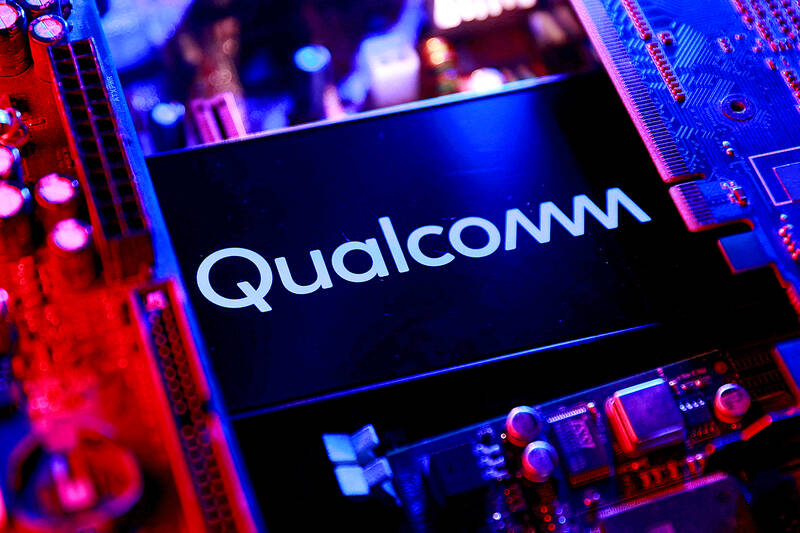US semiconductor manufacturer Qualcomm Inc admitted that it had not informed Chinese authorities when it completed its acquisition of Israel’s Autotalks Ltd in June, China’s market regulator said yesterday.
The disclosure was made two days after China launched an antitrust investigation into Qualcomm, examining whether the US firm contravened Chinese regulations by not declaring some details of its acquisition of the Israeli chip designer.
Qualcomm did not immediately respond to a request for comment.

Photo: Reuters
The Chinese State Administration for Market Regulation (SAMR) said it informed Qualcomm in March last year that the deal requires approval by the regulator, and the US firm in the same month notified SAMR it would not pursue further.
However, Qualcomm in June this year completed the deal without informing the authority, the regulator said, adding that the chip company “acknowledged above facts,” based on which Beijing launched the antitrust probe.
Qualcomm’s shares fell more than 5 percent on Friday after US President Donald Trump threatened to hike tariffs against China and cancel a planned meeting with Chinese President Xi Jinping (習近平).
Beijing is targeting Qualcomm, which has technology that is key to smartphones and networking, in the run-up to talks between Trump and Xi. Both countries are maneuvering for leverage ahead of the expiration of a US-China trade truce — even at the risk of escalating tensions.
Apart from Qualcomm, Chinese regulators also announced an investigation into Nvidia Corp’s 2020 acquisition of networking gear maker Mellanox Technologies Ltd. That probe was unveiled just as Beijing and Washington officials sparred over trade and other issues during wide-ranging negotiations in Madrid about a month ago.
Nvidia, which is caught in the middle of the two nations’ export controls negotiations, slid nearly 5 percent on Friday.
Friday’s announcement also drove shares in Alphawave IP Group PLC about 6.5 percent lower in London. Qualcomm is in the process of buying the company in a US$2.4 billion deal struck earlier this year.
Additional reporting by Bloomberg

Taiwan’s foreign exchange reserves hit a record high at the end of last month, surpassing the US$600 billion mark for the first time, the central bank said yesterday. Last month, the country’s foreign exchange reserves rose US$5.51 billion from a month earlier to reach US$602.94 billion due to an increase in returns from the central bank’s portfolio management, the movement of other foreign currencies in the portfolio against the US dollar and the bank’s efforts to smooth the volatility of the New Taiwan dollar. Department of Foreign Exchange Director-General Eugene Tsai (蔡炯民)said a rate cut cycle launched by the US Federal Reserve

Handset camera lens maker Largan Precision Co (大立光) on Sunday reported a 6.71 percent year-on-year decline in revenue for the third quarter, despite revenue last month hitting the highest level in 11 months. Third-quarter revenue was NT$17.68 billion (US$581.2 million), compared with NT$18.95 billion a year earlier, the company said in a statement. The figure was in line with Yuanta Securities Investment Consulting Co’s (元大投顧) forecast of NT$17.9 billion, but missed the market consensus estimate of NT$18.97 billion. The third-quarter revenue was a 51.44 percent increase from NT$11.67 billion in the second quarter, as the quarter is usually the peak

The US government on Wednesday sanctioned more than two dozen companies in China, Turkey and the United Arab Emirates, including offshoots of a US chip firm, accusing the businesses of providing illicit support to Iran’s military or proxies. The US Department of Commerce included two subsidiaries of US-based chip distributor Arrow Electronics Inc (艾睿電子) on its so-called entity list published on the federal register for facilitating purchases by Iran’s proxies of US tech. Arrow spokesman John Hourigan said that the subsidiaries have been operating in full compliance with US export control regulations and his company is discussing with the US Bureau of

Pegatron Corp (和碩), a key assembler of Apple Inc’s iPhones, on Thursday reported a 12.3 percent year-on-year decline in revenue for last quarter to NT$257.86 billion (US$8.44 billion), but it expects revenue to improve in the second half on traditional holiday demand. The fourth quarter is usually the peak season for its communications products, a company official said on condition of anonymity. As Apple released its new iPhone 17 series early last month, sales in the communications segment rose sequentially last month, the official said. Shipments to Apple have been stable and in line with earlier expectations, they said. Pegatron shipped 2.4 million notebook